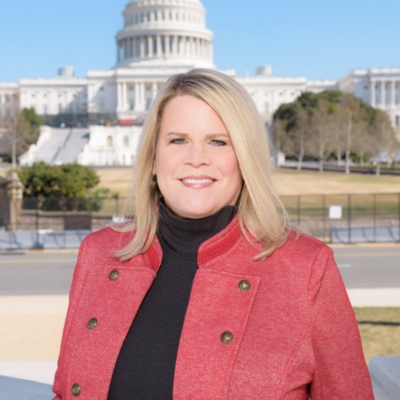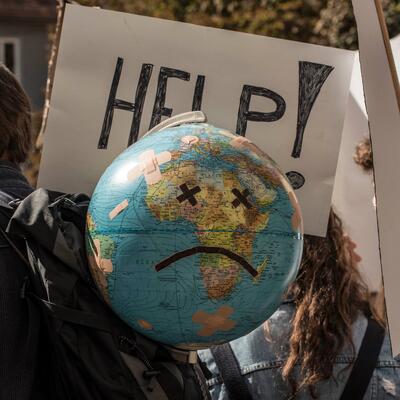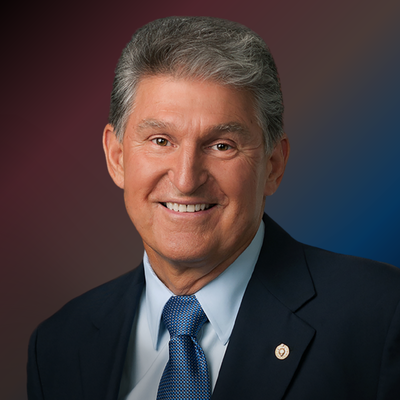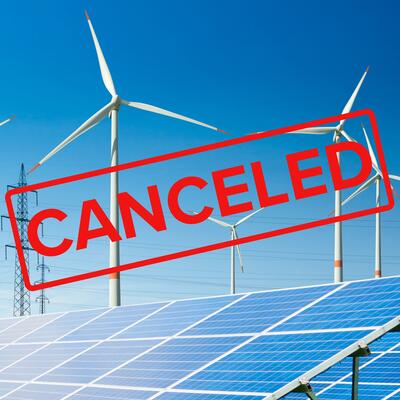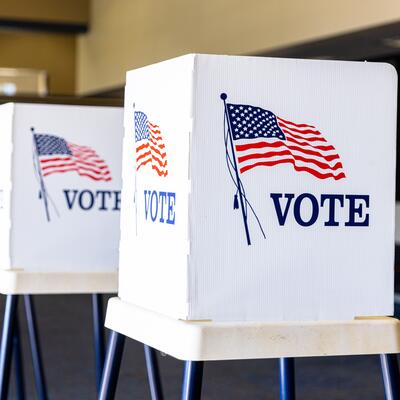
What’s at Stake in November
Guests

Nathaniel Stinnett

Emma Shortis

Coral Davenport

Alana Casanova-Burgess
Summary
There’s one tool nearly all of us have access to that can change the course of our climate future: voting.
Political leaders control vast budgets, set sweeping policies, and influence market forces on a global scale. And deciding who is leading depends on all of us — the public — making our voices heard.
“Politics is the most important lever for change when addressing the climate crisis,” says Nathaniel Stinnett of the Environmental Voter Project, a group working to mobilize voters who care about climate. “If climate voters show up, they can choose the next president, they can determine the Senate, and they can determine the House,” he says.
But it seems like it’s especially hard to get people motivated to vote this year, when — at least for the moment — the choice for president is between the same two candidates we’ve seen before. Regardless of who leads the tickets in November, the choice is really between two parties, two paths for our climate future that couldn’t be more different.
In the last four years, President Biden’s administration has made huge strides toward reducing emissions and building a renewable energy economy with several pieces of new legislation.
“More money than has ever been spent on clean energy, on climate initiatives, in one go, in the United States, in history,” says New York Times Reporter Coral Davenport.
Biden has been a very successful and consistent climate leader. His landmark climate bill, the Inflation Reduction Act, puts $370 billion over ten years toward climate initiatives, a truly unprecedented investment. Still, the administration hasn’t done a good job making voters aware of its wins.
“Voters don't seem to really get that [the Inflation Reduction Act] is done and it's a law and sort of all this money is being poured into this and it's a big deal,” Davenport says. “It's a huge first step and it's also not enough. It will have a huge impact in transforming the nation's energy economy and reducing emissions tremendously.” But she says in order to avert the worst, most deadly and expensive impacts of climate change, “we need to do a lot more really fast.”
By contrast, the Trump administration eroded decades of progress on environmental and climate goals. It removed protections from waterways and weakened limits on carbon dioxide and mercury pollution, and stripped language about climate change and carbon from federal websites. If he’s reelected, Trump has promised to double down on fossil fuel production, to limit subsidies for electric vehicles and batteries, and to roll back as many of Biden’s efforts as he can.
This fall, the U.S. role in the climate emergency is on the line. And the results of this election will be profound, not only for this country, but for our planet.
“The consequences are so significant, globally, that we're all kind of watching with horror and bated breath from outside the United States,” says historian Emma Shortis.
Episode Highlights
03:30 – Nathaniel Stinnett on why voting is an important climate lever
07:30 – Getting “climate first” voters to the polls
13:00 – Polling on Biden’s climate record for young voters
18:00 – Climate stakes for this election cycle
21:30 – Similarities between Trump’s 2016 approach to climate and his current approach
23:30 – Impact of Trump pulling the U.S. out of the Paris Climate Accords
28:30 – What Project 2025 agenda would mean for climate if Trump is reelected
36:00 – “This is the most important election in potentially 150 years.” –Emma Shortis
40:30 – Impact of young climate voters on Biden’s climate agenda in the last four years
48:00 – Biden admin’s failures to communicate its climate wins, including the Inflation Reduction Act benefits
55:00 – Recent Supreme Court decisions and how they will impact future climate action
What Can I Do?
Resources From This Episode (5)
Full Transcript
Note: Transcripts are generated using a combination of automated software and human transcribers and may contain errors. Please check the actual audio before quoting it.
Ariana Brocious: This is Climate One, I’m Ariana Brocious.
Alana Casanova-Burgess: I’m Alana Casanova-Burgess.
Ariana Brocious: On today’s show: What’s at stake in the November election.
[music change]
Alana Casanova-Burgess: I mean what’s NOT at stake in the November election, y'know what I mean?
Ariana Brocious: I know. The stakes feel SO high, everything is on the line, and yet all I kinda want to do is put my head under a pillow til it’s over, you know? It’s so overwhelming. And I also know that’s not really an option.
Alana Casanova-Burgess: Right, yeah. Because when it comes to changing the trajectory of climate change and preserving our ability to survive on Earth, few forces have the power and the reach of politics. It controls vast budgets, it sets sweeping policies, and influences market forces on a global scale.
Ariana Brocious: We’re recording this in mid-July and it’s anyone’s guess who will be at the top of the Democratic ticket come November.
Alana Casanova-Burgess: Right, but candidates aside, the choice is really between two parties, two paths. And on so many issues, they couldn’t be more different. On today’s show, we’re going to review the climate records of the Trump and Biden administrations – and try to game out what the future will look like depending on the results in November.
Ariana Brocious: And as you’ll hear in the conversations ahead, there are a few things that are already clear. Number 1: even though the Biden administration hasn’t done a good job making voters aware of its wins, he has been a VERY successful and consistent climate leader. The Inflation Reduction Act alone was huge: $370 billion over ten years toward climate initiatives, a truly unprecedented investment..
Alana Casanova-Burgess: Number 2: The Trump administration eroded decades of progress on environmental and climate goals. It removed protections from waterways and weakened limits on carbon dioxide and mercury pollution.
Ariana Brocious: Number 3: if he’s reelected, Trump has promised to double down on fossil fuel production, to limit subsidies for electric vehicles and batteries, and to roll back as many of Biden’s efforts as he can.
Alana Casanova-Burgess: And one more thing it’s important to keep in mind: We’ve seen how recent decisions by the Supreme Court have undermined the power of federal agencies to regulate almost anything, and have granted whomever is president immunity for official acts, whatever that means. You can draw a clear line from these decisions back to the justices Trump appointed. And the next President will likely have the opportunity to appoint more Supreme Court justices.
Ariana Brocious: In short, there is a lot at stake in November. But we the people have power through our vote! And that’s where we’re going to start the show. Nathaniel Stinnett is founder and executive director of the Environmental Voter Project. For the last decade, the group has worked to dramatically increase the number of voters who consider climate their top issue and make them consistent voters. He spoke about how his organization does that with Climate One’s Austin Colón.
Austin Colón: When I talk to a lot of people about climate action, the conversation oftentimes goes to, you know, what EV should I get? Or how can I get, you know, solar panels on the roof or which appliances are less energy intensive. But the more I read, the more I hear people saying that voting is the single most important climate action an individual can take. Can you explain why voting is so important?
Nathaniel Stinnett: So many of the crises that come together to create the climate crisis, and we are talking about multiple crises here, are huge systemic political problems. And systemic political problems require systemic political solutions. And just as an example of this, no matter how much you reduce your own personal carbon footprint, you're not going to be able to change the mix of clean or dirty energy that gets pumped into the grid.
So when you're using electricity, you kind of have no choice. You have no control over that because it's one of these huge systemic political issues. So for better or for worse, politics is the most important lever for change. When addressing the climate crisis.
Austin Colón: Right. And there seems to be a polling trend where the majority of Americans want action taken on the climate crisis, but few of them list climate as a top priority. And I just kind of want to get an idea of, among the electorate, like what percentage of the voters are climate first voters?
Nathaniel Stinnett: Yeah. So that's a great question, Austin. And you're right. I think it's so important for your listeners to understand that they might see a lot of polls showing how many Americans support government action on the climate crisis. But that doesn't mean that it's a top priority for many people. And when we look at polls and when we look at our own data, we see that only 4 to 8% – Now, obviously, that's a decent size spread. But if you look at all of these polls, anywhere from 4 to 8 percent of registered voters say that climate change is their number one priority. And what that calculates out to is about 18 million registered voters who list climate change above all else. Now, that's a big number. But it's nowhere close to what we need it to be.
Austin Colón: 18 million voters. And you say, and I agree, that's not enough, but is that enough to swing elections in tight races, which, you know, it looks like we're going to have a lot of tight races coming up in November.
Nathaniel Stinnett: We will have a lot of tight races. And first, let me be clear. Just because there are potentially 18 million registered voters who list climate as their top priority. doesn't mean they're actually going to show up and vote. And obviously that is the biggest determining variable here. But could they make a difference if they do show up? Absolutely. So let's just take as an example, Pennsylvania, which is most likely to be the tipping point state that puts either Trump or Biden over the top with 270 electoral votes. So in 2020, Pennsylvania was decided by just 80,000 votes, but at the Environmental Voter Project, we've identified 250,000 climate-first registered voters in Pennsylvania who have never voted before.
Austin Colón: Wow.
Nathaniel Stinnett: Yeah, so, so to, to, to think about this another way, there are three times as many potential first time climate voters in Pennsylvania as the entire margin of victory was in that state in 2020. So yeah, like if climate voters show up, they can choose the next president, they can determine the Senate, and they can determine the House.
Austin Colón: Which getting climate voters to show up is exactly what you guys are doing over there at the Environmental Voter Project. Could you explain what tactics you're taking this election cycle to get those voters to the polls?
Nathaniel Stinnett: Yes. We work in 19 states. And we've identified 4.8 million already registered voters who list climate as their top priority, yet they have never voted before. So those are our targets. And what we're doing is we're working with now almost 7,000 volunteers to canvas, call, and send postcards to these voters. And then we as a staff also run digital ad and direct mail campaigns. All with behavioral science informed messaging. That's completely nonpartisan, but it's designed to do just one thing and one thing only, and that is get these people to vote. We are not in the mind changing business at the Environmental Voter Project. We want to find people who already care deeply about climate, yet aren't voting, and then change their behavior and get them to vote.
Austin Colón: Right. in the past I've heard you say when addressing a YouTube audience for the Environmental Voter Project that people who have climate higher on their priority list are actually less likely to vote. Like that really blew my mind. Could you explain why that would be?
Nathaniel Stinnett: Right. And we know a little bit about what's behind this but there's a lot of stuff that we don't know because it's very hard for social scientists to figure out Why people don't do certain things, but let me tell you what we do know. The first is people who care deeply about climate and other environmental issues are disproportionately young, they're disproportionately people of color, and they're disproportionately lower income. And those three groups vote less often, in part, because they are the target of most voter suppression efforts. So part of what's going on here is that ballot access is a real problem for the climate movement. The second thing that's going on gets back to what you alluded to earlier, Austin, and that is that the climate movement has been strangely apolitical for a very long time.
When we think about addressing the climate crisis, we think about eating less meat. Or biking to work or changing he electricity we consume, all of which are really important, but like you would never hear a reproductive rights activist talk that way. Like, they understand that this is a political problem that requires a political solution, but we don't think that way yet in the climate movement. And that certainly impacts voter turnout.
Austin Colón: Right. And can you share, a story of a conversation one of your canvassers has had with a potential voter and can you shed some light on like what motivates people to vote?
Nathaniel Stinnett: Yeah, so, you know one example, That I like to use not because it's a terribly dramatic conversation But it yielded very dramatic results. And that was just a few years ago in Georgia. It was after those two U.S. Senate runoffs that I think everybody remembers happening.
Austin Colón: Yes.
Nathaniel Stinnett: There was a really small special election for district attorney in rural Georgia. And one of our volunteers spoke to a voter, and the voter said something that was totally unsurprising. Which was, “Why should I vote in this election, and why on earth is an environmental group trying to get me to vote in this election?” Which was a very good question. And our volunteer said, Who you vote for is secret, but whether you vote or not is public record. And when politicians run for office, they look at public voter records, and who do you think they care about? Do you think they care about the voters or the non voters?
Austin Colón: Hmm.
Nathaniel Stinnett: We are trying to help you become a first class citizen so that more and more politicians pay attention to your concerns. Well, not only did that voter say that they were going to vote, but, because it is public record, we were able to look it up afterwards, and sure enough, she did vote, and she has become a consistent voter.
Austin Colón: Wow.
Nathaniel Stinnett: And that is how we really drive policymaking, not just at the federal level, but also the state and local level, because politicians like to win elections, and so they're always going to go where the votes are.
Austin Colón: Right. Yeah. And then the less scrupulous, you know, politicians among them will try to change the rules to, to help there. But anyway, that's a, it's another topic. but kind of on the flip side, like in, in 2020, there's a narrative that environmental voters help put Biden over the top. And yet this cycle, those same voters seem upset with some of the projects that the administration has approved. debate performances. Do you see polling that supports a drop in young voters over climate?
Nathaniel Stinnett: Well, certainly, voters are very disillusioned. About everything right now and that absolutely applies to young voters. In fact, it even applies to young voters a little bit more than voters of other age groups So there is no doubt that there is this baseline disillusionment, not just with Joe Biden, but with Donald Trump and with everything with ice cream and puppies, too. Like people are really anxious and upset right now.
Austin Colón: Yeah.
Nathaniel Stinnett: Now are we seeing that impact polling data? Yes, but not necessarily in the way that you might think. We are not seeing in any of the polling data that climate voters, at least in the way we define them at the Environmental Voter Project, which is people who are likely to list it as their number one priority. We're not seeing those voters drift to Donald Trump or to third party candidates. What we seeing Is that they are much more likely to say, uh, I'm probably not going to vote this time around. They're deciding between Joe Biden and the couch and that's the real crux of the issue with the climate movement this year.
Austin Colón: Right. The Biden administration has done quite a bit on climate. Um, maybe even the best work they've done as an administration has been climate work, but it makes me wonder, like, since Americans don't list climate that high on their priority list, has his administration's focus on climate put him kind of behind the coming up on his reelection bid?
Nathaniel Stinnett: I have not seen any data that that It shows there are people who would otherwise vote for Joe Biden, but they're now deciding not to because of his views or accomplishments on climate. I don't think he has lost a single vote because he, because of his climate leadership. I think he has gained a lot of votes because of his climate leadership. But you're absolutely right to point out that, like, this is not the first, second, or even tenth thing that people think about when they are thinking about the current presidential election. I mean, it's certainly not the story coming out of the debate. It's certainly not the story that people see when they watch CNN or MSNBC or Fox News. It's not what people are thinking about. It is a potential advantage for Joe Biden. You look at polls that ask, How do you rate the major candidates on X issue or Y issue or Z issue? And the issue where Joe Biden consistently has the biggest lead over Donald Trump is climate change, more than any other issue.
Austin Colón: Yeah. And I've heard even young conservative activists say that, you know, they're worried that their party is going to lose an entire generation over the climate issue, like, like, you know, people do care about climate. We need to get that bumped higher on the priority list for them.
Nathaniel Stinnett: That's exactly right. And one thing that young, conservative climate activists are very good at pointing out, and so I think it bears repeating, is that climate leadership is not unpopular for most Republican voters. Whether you're a Democrat or a Republican, if you lead on climate, there are very few votes to be lost because of it. And I think that's really important for people to always understand.
Austin Colón: Interesting. Okay. So I want to switch gears a little bit and. stop talking about the presidential, uh, seat and start talking about the house where in 2022, the house was pretty much decided in New York, which is one of the few places Democrats actually underperformed, uh, where should we be looking in 2024 for a similar effect,
Nathaniel Stinnett: Well, you don't have to travel far, Austin. I think you should stay in New York.
Austin Colón: right?
Nathaniel Stinnett: Certainly three out of the four congressional seats on Long Island But maybe all four of them are going to be very close Then there are another four close seats if you go up the hudson valley and then over into Syracuse and Utica So there are anywhere from six to eight very competitive house districts in new york state and that could actually Absolutely determined control of the U.S. House of Representatives. Similarly, California has a whole lot, roughly just as many as New York, a whole lot of competitive U.S. House seats. So yeah, it is very important to pay attention to the battleground states that will be important for the presidency and the U.S. Senate. So the Pennsylvania's and the Arizona's and places like that. But New York and California. Could very well decide which party controls the house and so you can't ignore them.
Austin Colón: Right. Renowned climate scientist, Michael Mann has been quoted as saying that a second Trump term would mean game over for climate. So, I mean, how high are the stakes for climate this election cycle?
Nathaniel Stinnett: I know that people roll their eyes when you say, this is the most important election ever. But Austin, it's the most important election ever! Now, I am not a climate scientist. But, I'm, I'm smart enough to know that If you have a problem that is consistently getting worse and worse and worse, And you have less and less time to fix that problem, then yeah, every opportunity you have becomes the single most important opportunity you've ever had. And so, there is no doubt in my mind that the 2024 election for the presidency, for the Senate, for the House, for gubernatorial elections, is the single most important set of elections we have ever faced in the climate movement. Moreover, there is no doubt in my mind that 10 years from now, 20 years from now, people are going to look back at this as a really important moment. When we went one way or we went the other way and lives are on the line Millions of lives are on the line.
Austin Colón: Well, Nathaniel Stinnett, founder and executive director of the Environmental Voter Project. Nathaniel, thanks for coming on Climate One today.
Nathaniel Stinnett: My pleasure. Thanks for having me.
Alana Casanova-Burgess: Today on Climate One: we’re talking about what’s at stake in the November election.
Coming up, Donald Trump has said that if he’s re-elected, on day one he will flex the powers of a dictator to “drill baby drill.”.
Emma Shortis: It is extraordinary. I think that he's linking that idea of being dictator for a day specifically to oil drilling. So there's this association of, of power and strength in particular with drilling for oil.
Alana Casanova-Burgess: That’s up next, when Climate One continues. We’ll be right back.
Ariana Brocious: Please help us get people talking more about climate by sharing this episode with a friend. And we’d love to know what you think of the show. Please give us a rating or review. You can do it right now on your device – and it really helps people find the show. Thanks!
This is Climate One. I’m Ariana Brocious. This spring, at a gathering of oil executives at Mar-a-Lago, one of them complained to Trump that despite spending $400 million lobbying the Biden administration, his company will still face environmental regulations. According to the Washington Post, Trump then told the group that they should collectively raise a billion dollars to put him back in the White House.
The first time he was in office, he rolled back a staggering number of environmental safeguards – his administration even removed the words “climate change” and “carbon” from many federal websites. Emma Shortis, a scholar at RMIT University in Melbourne and the Australia Institute researches US political history and how it relates to the rest of the world – and she says that his message now isn’t that different from where he was eight years ago.
Emma Shortis: I think if you compare 2016 to even 2020 and now this election cycle, not a lot has changed. I mean, Trump has certainly become more extreme in his rhetoric. But if you go back to 2016, I think Trump is still using the same kind of messages around, you know, a radical climate agenda and particularly undoing the climate action programs of the Obama administration. And is, I think, focused on this particular issue. image of what climate action does and who in particular it attacks. And so he often in, you know, the lead up to 2016 is deploying this image of coal miners and fossil fuel workers being under attack by the East Coast and liberal elite who don't understand what real work is. And, and so particularly, I think with, with coal miners, you see this image of a kind of rustic, particularly white man worker who's being forced into destitution by liberal elites. And that, that's a message that, you know, is still really running through Trump's campaign and is also reflected in places like Australia where we see really similar messaging as well.
Ariana Brocious: And what's so interesting about that is that there are coal miners affected. There are coal mines closing, people being put out of work. But it is a really small percentage of the population and they have sort of an oversized impact in terms of rhetoric when it comes to this idea of who's being affected by the energy transition, right? Okay, so Trump gets elected. He pulls out of the Paris Climate Accords, obviously a huge departure from past administrations. What were the implications of that decision within the U.S. and also kind of on the international stage?
Emma Shortis: Sure. Look, I think that the signal that that sent the withdrawal from the Paris Climate Agreement, you know, because it was done so early in the administration with a kind of flourish of an executive order, it really signaled, both internally in the United States, but also internationally, how much was about to change with the Trump administration. You know, I think nobody really knew what to expect. It was such a surprise, including to Trump and his team that he'd won. But this, I think, previewed a suite of changes, mostly, mostly regulatory rollback in terms of environmental protections in particular. I think the Trump administration rolled back something like about a hundred environmental rules and safeguards. So there are the immediate consequences of that, including dramatic increases in greenhouse gas emissions that came with those different policies and regulatory changes. And then internationally, of course, I mean, I am wary of suggesting that the United States is a role model in a straightforward way when it comes to climate action. Because of course, you know, while there had been significant positive progress, particularly under the Obama administration, you know, which was critical to negotiating Paris in the first place, the United States of course, has not necessarily been a good faith actor when it comes to climate action generally, and the same is true very much true of Australia. And so while, certainly sent a signal internationally withdrawing from the Paris Agreement and sent many countries who were in favour of climate action into despair, it was also very convenient, I think, for nations like Australia, which is a effectively a petro state, because it allowed Nations like mine to hide behind the kind of egregious climate policies of the Trump administration to suggest that our policies were positive for climate action, that we were doing a lot, especially compared to the United States when in fact, you know, we were also acting really in bad faith when it came to climate policy.
Ariana Brocious: So we became an easy scapegoat when it came to that. But when we spoke before, you also mentioned that it gave maybe increased latitude or encouragement to European countries, for example, to take bolder steps on climate because it was kind of like, well, if the U.S. isn't leading, then we could, right?
Emma Shortis: It certainly did. I think particularly in Europe, there is always, or in the European Union, there's always this compulsion to stand up and be counted internationally and to lead in policy areas. And the European Union certainly has led in climate policy in particular. Um, that the Trump administration withdrawal from Paris, I think created space for Europe to step up when it came to climate action. But interestingly, what happened I think was, was not necessarily that the European Union did that on a massive scale, but that in fact, cities and smaller regions, you know, cities like Paris in particular, really brought forward their climate action. And I mean, we saw a similar thing in the United States where cities took action where they felt the federal government was failing. And I think that was a really interesting phenomenon that has really continued, especially in Europe, where European cities in France, Germany are enacting their own climate action policies, particularly at the local level. And there was, I think, real hope, especially in the, probably in the first half of the Trump administration, that that would make the difference, you know, that that would, I suppose, offset some of the radical action that was coming out of the United States. But there has since been a recognition, I think, that there is no substitute for action at the national and international level.
Ariana Brocious: So, as you've said, once President Trump came to power, he spent a lot of time rolling back Obama era directives and executive orders dealing with climate, particularly replacing Obama's clean power plan with a much weaker plan. And I think this can kind of be seen as a continuation of this anti-elite, sort of anti-enviro stance, right? Where, anything that limits the power of fossil fuel companies or corporations is therefore, you know, is anathema to the kind of country that Trump wants. What does that mean for the current climate executive orders and directives that President Biden has issued if Trump were reelected to a second term?
Emma Shortis: Unfortunately, what we would see is the same thing happening again, but worse, right, because especially in the first administration, the first Trump administration, you know, there wasn't a detailed plan, I think, for that administration or for action that was marked by chaos and, and kind of a fundamental misunderstanding, I think, of how power even works in the United States. That is no longer true, right? Because not necessarily Trump himself, but the movement behind him and, and his campaign have engaged in a concerted effort to plan for a second Trump administration and particularly to plan for almost total rollback of Biden administration climate policies. So if you look at Project 2025, for example, which many people may have heard of, it's a Heritage Foundation plan for the next conservative administration of the United States. And that outlines in really quite frightening detail how much of the Biden administration's policies would be withdrawn, including, you know, almost everything to do with the Inflation Reduction Act and the, the words used are warlike in terms of annihilating policies and engaging in policy warfare against a radical climate agenda, even to do things like completely eliminate the National Oceanic and Atmospheric Administration.
Ariana Brocious: That's yeah, there's a lot in that document. I want to interject for just a second because the Inflation Reduction Act was an act of Congress, right? It was passed by Congress, not in a bipartisan fashion, but it is not an executive order. So doesn't that give it a bit more protection, longevity against any future president?
Emma Shortis: I think it should. That certainly is the idea. And, and I think, you know, it was the Biden administration's plan in terms of getting this legislation through. That's why they worked so hard to do it because they had learned the lessons of previous administrations where, you know, executive orders can be rolled back, with a signature. And so I think that for that reason, parts of the Inflation Reduction Act should last. And of course, it depends on all kinds of things like the makeup of Congress after November, and particularly the makeup of the Senate. But what I think is what's so striking about Project 2025 and the mandate for leadership is that it outlines really detailed plans to roll back parts of the regulatory framework of the Inflation Reduction Act, which don't require acts of Congress. And it's doing things like defunding programs, like the Clean Energy Corps, for example. And so it's of that detail that is particularly striking because it demonstrates an understanding of how those systems work and how to undermine them from the inside without necessarily using the legislative or democratic process to do so.
Ariana Brocious: Right. So Trump has even made statements directly about being a dictator. Let's listen to him in his own words
Donald Trump: He says, “You’re not gonna be a dictator are you?” I said, “No, no. Other than day one. We’re closing the border, And we’re drilling drilling drilling. After that, I’m not a dictator.”
Ariana Brocious: What's your reaction to that?
Emma Shortis: It is wild, isn't it? I think it's so easy to become accustomed to that kind of rhetoric because it's so common now, but it is extraordinary. I think that he's linking that idea of being dictator for a day specifically to oil drilling. So there's this association of, of power and strength in particular with drilling for oil. And again, that aligns completely with the Heritage Foundation Project 2025 plans where they outline in, again, quite a lot of detail plans to dramatically increase fossil fuel extraction and production on the United States mainland by doing things like further opening the Arctic National Wildlife Refuge to oil drilling, by changing licensing agreements as much as possible, by making sure that, for example, environmental considerations aren't taken into account when opening new LNG projects. And, and so there's this plan, overarching plan for what Project 2025 describes as full spectrum energy dominance in fossil fuels. And you can see that aligning exactly with what Trump just said there about dictatorship being associated with fossil fuel powers. And again, that's about more than I think, kind of grandstanding, it's about an overarching ideological position on power and who is a real person and who has a real job. And this idea that, you know, those liberal elites committed to climate action are not real people and are not worthy of being considered as such.
Ariana Brocious: Yeah. And so in keeping with this idea, Trump has also declared a war on electric vehicles. And you know, this goes along with this idea that somehow by providing people incentives to purchase electric vehicles, that's limiting the choice Americans have, when in fact, it really seems the opposite, right? We're giving people more choices. And there's a pretty strong counterargument that divesting from fossil fuels and investing in all these renewable technologies would give the U. S. greater energy security because they would have more resources at its disposal. What are Trump's plans to ”end EVs?”
Emma Shortis: I mean, you're so right to, to point out how illogical these arguments are, but it's worth saying that they don't care, you know, they're not interested in, in the logic of this, this is about propping up certain power systems. And so Trump, again, has been, he has this particular ideological bent against electric vehicles or, or really anything that's solar powered or battery powered, who will often go on really quite strange rants about batteries as opposed to real power. Again, he's not a details guy, but plans around electric vehicles are to use them as a wedge against China, because there's this understanding that China in particular is producing cheap and efficient EVs ready for export and so is able or will be able to dominate that but again, instead of, you know, building up a national EV industry, manufacturing industry, that is being used as a way to attack what is regarded as an ideological enemy, an existential enemy, really, of the United States.
And I think it's been particularly disappointing that the Biden administration has kind of indulged in, in that as well, in its own policies towards China, because, you know, Particularly given the, the tensions between the United States and China, climate action for a little while there was regarded as one of, one of the only pathways to cooperation and into stabilizing that relationship.
Ariana Brocious: And even if Trump weren't to wholly embrace Heritage Foundation's Project 2025 plans. There's enough of it in there to give us a sense that a second Trump term would be pretty destructive for the global climate. Is that fair to say?
Emma Shortis: Yeah, it would be hugely destructive. I think, you know, modelling suggests that, you know, even just some of the regulatory rollbacks that are detailed in these plans would result in an increase in emissions from the United States, equivalent to that of the European Union. You know, this is huge. And that's not including increases in oil production. For example, because that's of course difficult to model. But so you have those immediate material consequences. and then of course you have the flow and effects to go back to our earlier conversation internationally, where again, bad faith climate actors like Australia now have a kind of bogeyman to hide behind when it comes to international climate action, you know, because of course the United States already isn't on track to achieve its Paris targets to keep warming at or below 1.5 degrees. It's grim. Sorry.
Ariana Brocious: It is grim. It is, it is. And so how do you answer the question, what's at stake for the world, not just the US, but the world this November with this election coming up?
Emma Shortis: It's so easy to say that so much is at stake, but, but it really is, you know, I think President Biden is right to say that this is a battle for the soul of America. This is the most important election in potentially 150 years. It's critical for the United States domestically, not just because of all of the, that we've spoken about, but because of the overall plans that the Trump campaign has for a second term, and particularly because of the Supreme Court judgment which, you know, effectively suggests that a president has absolute immunity, which is just, it's extraordinary. I think viewed, viewed from outside the United States, there's this tendency to reduce the consequences down to. without wishing to minimize those consequences, um, questions like, you know, will Trump withdraw from NATO? How will his alliances be affected? But I think the stakes are so much higher than that in terms of, what will it mean for the way the United States exercises power in the world? There's this assertion often that Trump, you know, hates war and is an isolationist and kind of withdraw the United States from its significant role in the world. And I, I just don't think that's true. I think Trump loves violence. He loves stomping all over things and the consequences of that for big alliances and big relationships, of course, are really significant. But it's also worth asking, you know, what does that mean for the Pacific viewed from Australia? You know, what does that mean for small island states in the Pacific who are already struggling, for example, with sea level rise and climate mitigation and are getting, you know, some support, but, but often bad faith support. What does that mean for our region? What are the geopolitical consequences of that? And, and how does a potential Trump victory embolden the far right internationally, you know, the far right in Australia, the far right in, in Europe. And so the. so hard not to be, to descend into kind of, we're all doomed, but, the consequences are so significant, globally that we're all kind of watching with horror and bated breath from outside the United States. But of course, you know, none of that is inevitable. I don't want, I don't wish to descend into despair. There's a long time to go before November, anything could happen and there are signals always from the United States that grassroots campaigning and organising can have such a huge impact on elections. So I'm still hopeful despite all of that despair that I just outlined.
Ariana Brocious: Yeah, that's okay. Be hopeful and a realist and fair to say the stakes are high.
Emma Shortis: Very high.
Ariana Brocious: Emma Shortis is an adjunct senior fellow at the School of Global Urban and Social Studies at RMIT University in Melbourne, Australia. Emma, thank you so much for joining us on Climate One.
Emma Shortis: It's my pleasure. Thanks so much for having me.
Ariana Brocious: Coming up, the Biden administration has had some big wins in terms of climate policy. But its failed to communicate those wins:
Coral Davenport: Voters don't seem to really get that this is done and it's a law and sort of all this money is being poured into this and it's a big deal. Particularly from the younger environmental activist community, I think there continues to be a sort of a sense of disappointment, actually.
Ariana Brocious: That’s up next, when Climate One continues. We’ll be right back.
Alana Casanova-Burgess: This is Climate One, I’m Alana Casanova-Burgess.
Think back to Biden’s first days in office, back in 2021.
Tape: We can no longer delay or do the bare minimum to address climate change. This is a global existential crisis and we’ll suffer – all suffer – the consequences if we fail.
He rejoined the Paris climate agreement. And he signed a flurry of executive orders reversing many of the Trump administration’s energy policies. It signaled that climate was a major priority – a sign of what was to come in this administration.
Coral Davenport is the energy and environmental policy reporter at the New York Times, a beat she’s covered for 20 years. She says that focus on climate was a reflection of what happened during Biden’s campaign.
Coral Davenport: When Biden was battling for the democratic nomination and he was kind of emerging as a front runner, there was a group of really influential young voters, climate activists, who said, you know, the price of our endorsement for you is for, you know, you to go from kind of being a standard democratic, politician on this sort of, yes, climate's important. It's one of my laundry list of issues to saying, I'm going to take climate and put it at the top of the list. I'm going to prioritize it. I'm going to make it central to my campaign. and they were successful. Biden responded to these climate activists and he didn't just say, okay, I'm going to make climate more important. He also really increased the ambition of his own climate policy. He had pledged about 1.2 trillion to spend on climate change. In his administration, he increased that to 2 trillion, which is massive. and he really did kind of retool his campaign to say, climate change is going to be one of the four issues that drives everything I do throughout my whole administration. It was kind of a moment of transformation and it was very much in response to these voters. And he did follow through on that after the election.
Alana Casanova-Burgess: Right. So it's sort of, I hear you, I see you, I'm doing it, I'm doing the thing, right? Can you talk about those 2 trillion a bit more? Were they devoted to a certain action plan? Was there a budget behind them or was it just like 2 trillion? Are you, are you happy now?
Coral Davenport: So there was, there was a basic blueprint of what they would be spent on. A lot of it was what it ended up being spent on, like massive amounts of tax breaks and tax incentives for clean energy initiatives, wind, solar, electric vehicles. sort of pour money into this massive clean energy transition. In terms of legislation, Biden and the Democrats in Congress had a razor thin majority and they went in with this kind of enormous proposal, trillions of dollars that they called the build back better agenda that ended up getting broken down into two pieces. First, a bipartisan infrastructure bill that was basically mostly money for roads and bridges and that kind of thing. And that was a kind of like big, really investment in building back after the COVID pandemic and then the second, the second piece of legislation, was supposed to be this gigantic, spending bill in the trillions of dollars that was going to be a giant social policy, healthcare, student aid, childcare aid, and massive, massive amounts of spending on these clean energy incentives. The centerpiece of that was something called a clean electricity standard, which would have mandated that all electric utilities produce a certain percentage of their electricity from zero carbon sources. And not from fossil fuels like, coal or natural gas. That was kind of like the cornerstone of it and a lot of the money would have gone to do that and so this was, that was sort of the, big sweeping, candy covered wish list that the Democrats brought to the table, that ended up getting whittled way, way, way down. They didn't have support from any Republicans, but even within their own party, they didn't have enough support for a lot of that agenda, particularly that clean electricity standard, that got knocked out by Senator Joe Manchin from West Virginia, a coal heavy state who objected to a lot of this. So what ended up happening, starting from the promise of $2 trillion on the campaign trail, that got knocked down to $370 billion in the legislation.
Alana Casanova-Burgess: Still a lot of money.
Coral Davenport: More money than has ever been spent, on clean energy, on climate initiatives, in one go, in the United States, in history.
Alana Casanova-Burgess: How do you think the people who you said were pushing Biden to have a more climate-forward agenda felt about that. Is that the kind of spending they were looking for?
Coral Davenport: I mean, objectively, the United States has never seen anything like this. What's interesting about 2022, we really didn't see the activist community coming out and celebrating it. In a huge way, you know, it's sort of like a mystery of marketing to me because they really did achieve objectively the biggest climate law in US history, and this money is being spent and, you know, this clean electricity and, and these electric vehicles, all this stuff is happening. But like, something that we know from our reporting is like, voters don't seem to really get that this is, this is done and it's a law and sort of all this money is being poured into this and it's a big deal. particularly from the younger environmental activist community, I think there continues to be a sort of a sense of disappointment, actually.
Alana Casanova-Burgess: Right. So you, you've been covering this for 20 years when the Inflation Reduction Act did pass. What was your personal reaction?
Coral Davenport: On one hand, it was the biggest climate law that the U.S. has ever passed. And it's a huge first step and it's also not enough. It will have a huge impact in transforming the nation's energy economy and reducing emissions tremendously. Also, we've known about the science, like this is something that we have known about at the highest levels of policymaking for 50 years. And that's how long it took to pass this law. And so it's a huge deal that it finally happened, but because they waited so long. It's not even close to enough. In order to cut emissions as much as they as the U.S. needs to cut them to avert the worst, most deadly and expensive impacts of climate change, they would need to go back and take a whole ‘nother bite. We need to do a lot more really fast. If they wait another 50 years, that's terrible.
Alana Casanova-Burgess: And I guess we shouldn't also skip over the symbolism of a climate bill being called the Inflation Reduction Act, I mean, there's other stuff in there too, right? But like, we're not even really talking about a bill that to the public, does the thing that it does.
Coral Davenport: I think that speaks to the bad politics of climate change. You know, like, polling always shows, and this makes sense, like, what voters care about is the economy and jobs. You know, this has been going on for decades, if you ask voters, you know, what they care about the most, you give them a list of like 20 issues, economy and jobs are the top one in climate environment or the bottom one, maybe, maybe like in the bottom five, like maybe they've climbed, and so it's sort of seen as like, you know, You have to frame it and you have to sell it as an economic bill and something that's going to help you at your kitchen table with employment right this minute.
Alana Casanova-Burgess: Well, regardless of what it's called, many voters don't seem to know it even exists or what it does. So why aren't the effects of the bill making their way to the average person?
Coral Davenport: I swear to God that's a mystery. You know, I went, and looked at examples of where this money is going. I'm looking just right now, like an 8 billion, 8 billion for expansions of factories that build, EV batteries in Liberty, North Carolina, 50 million for an EV plant in Elyria, Ohio, another 50 million, to build EV batteries in Elizabethtown, Kentucky. This money is going all over the place. The state of Georgia is now the leading EV battery hub in the United States. And you have Korean companies, continually locating there and hiring there and reshoring there and receiving millions and billions of dollars. So many examples in Georgia of this IRA money going to essentially build a new industry, um, in a red slash purple state. When we report on this and we talk to people in the administration, we say, Why don't Americans know about it? one of the answers they give is, the money is just starting. You know, this it's been flowing for a year or less. So a lot of what –
Alana Casanova-Burgess: How long does it take to write a check?
Coral Davenport: Well, so a lot of what we're seeing is like announcements, you know, that the money that the money has been granted, but not as much, you know, maybe it hasn't quite translated into groundbreaking, like into, you know, physical new plants and people receiving jobs yet, although that It has started, but it's new. Another reason is that a lot of this money is going into red states where governors and Republican politicians are happy to receive the money, but don't necessarily are not going to tout, you know, are not, are not going to give the president like the poll. And, and to some extent, the white house says, look, we just want this money out there and eventually the recognition will follow through. And that may be so. But of course, you know, the election is just a few months away.
Alana Casanova-Burgess: Could he market this as a job creator?
Coral Davenport: Yeah, he absolutely has done that from the very beginning. The White House has much more market of this about job creation than about emissions reduction. Here's the thing about that. Throwing a lot of money at clean energy, sort of a net wash of employment effect. It does create jobs. It absolutely creates new jobs in the clean energy sector. As clean energy grows and pushes out dirty energy, it creates job losses, like absolutely there are losses, there are and will continue to be losses of jobs in the fossil fuel sector. And, you know, we've seen a lot of economic studies on that, that basically the numbers cancel out. So, you create a lot of clean energy jobs, you lose a lot of dirty energy jobs, you end up with kind of a flat line, which is okay, except that it's not the same people getting the new jobs is losing the old jobs. There's this sort of vision that has been peddled of, Well, the coal miners are going to lose their jobs, but they're going to get new jobs installing solar panels for many reasons. It just isn't as clean and convenient. The jobs are created often in different geographic locations. They often require different skills. A big problem for the administration is that they're not always union jobs. A lot of gasoline powered cars are built in Michigan and in union states. A lot of the EV cars are being built in southern states that are not union states. So union jobs might be lost while non union jobs might be gained. and so marketing it as just a job creation bill is disingenuous.
Alana Casanova-Burgess: Right. Also on the, on the messaging and, and what the administration is saying and not saying, Biden has also been in charge of the country as the US has become the biggest liquid natural gas and crude oil exporter in the world, but, um, doesn't really bring that up very often. What, what does that mean for climate?
Coral Davenport: It's so interesting, isn't it? I mean, it's not great. The more fossil fuels you burn, the worse it is for the climate. There's no question about that. The natural gas boom has been going on in the United States for more than a decade. so what we're seeing is just kind of a continuation of this huge boom that's been going on for a while and so yes, the U. S. Is the largest oil and gas producer and exporter. We don't necessarily see the president touting this, but it's true. And this points to the broader problem of climate change, which is in no way is it something that can be solved by one country, even if that country is the world's largest economy? The big solution and economists tell us, tell us this is, You need policies that dramatically reduce demand for these fossil fuels. So you need, you know, you need Europe and you need China. You need the biggest economies collectively to transition their energy sectors. So that they do not need to be importing and using these cheap fossil fuels.
Alana Casanova-Burgess: There was another bill that passed in Biden's term, the Bipartisan Infrastructure Act. Can you explain why that was important to climate policy?
Coral Davenport: The Bipartisan Infrastructure Act didn't do much to reduce carbon dioxide emissions, but it was the first big law that kind of acknowledged how much climate change is already hurting our infrastructure. You have a lot of roads that have been damaged by extreme weather. You have a lot of bridges that have been washed out or are weaker as a result of exposure to extreme heat. Examples of extreme weather that are damaging infrastructure in ways that when it was first built wasn't were not accounted for. And so the idea is this money goes to rebuild infrastructure in a way that makes it resilient to the reality that we have more floods, more heat waves. So areas of the country that 50 years ago did not experience extreme weather and their infrastructure didn't need to withstand extreme weather. Now this money says, okay, before we rebuild, we're going to acknowledge sea levels are going to rise. Maybe we won't build roads in areas that are flooding now because of more sea level rise. Maybe we're going to build in different places. Maybe we're going to use different kinds of materials and technologies because we know that this infrastructure is going to be more vulnerable to the impacts of climate change. So that was something very new. And again, it wasn't about reducing emissions, but it was about saying we have to rebuild for the climate changed world that we're already in.
Alana Casanova-Burgess: Aside from legislation, there's also been the judiciary to contend with. We've had a conservative Supreme Court ruling against regulations on climate related cases during this Biden presidency. How has that shaped what he's been able to accomplish?
Coral Davenport: Essentially what we've seen from the Supreme Court in the past two years is a string of decisions that are really aimed at limiting the authority. Of agencies to regulate it all and I think that's going to have a big impact on the EPA which does climate change regulations So the Biden administration has done four major climate change regulations They've regulated fossil fuel emissions from power plants cars trucks and oil and gas drilling operations all of those regulations added up If they're enacted, we'll take a lot out of U.S. carbon dioxide emissions. They would have a big impact. In light of these Supreme Court decisions, you know, all of those regulations are already being litigated, and the cases against them just got a lot stronger. And the grounds for upholding them probably just got a lot weaker. I think in a couple years, all these big climate regulations that Biden did are going to be pulled way back or not going to exist anymore. And I also think that if Biden were to win a second term, I think they'll be much more cautious about trying to do regulations like that. I think there'll be a big chilling effect and regulations that they do will be much more modest and limited and narrow.
Alana Casanova-Burgess: So to sum up, when it comes to climate, what do you think is at stake in this election?
Coral Davenport: What scientists have told us is that we are in a very narrow window. By 2030, the world's major economies need to have cut their emissions in half from where they were a few years ago. And then be on track to eliminating emissions by 2050. I think the Biden administration has taken a significant step towards getting there, but it has to do more. If President Biden were to win a second term and could build on that and aggressively cut more emissions in a second term to meet that first 2030 goal, that would put us on the road to where we need to go. Again, all the other major economies need to do it too, just because you hit that first target doesn't mean you'll hit the second target, but there's a narrow window to do that. if the U. S. misses that moment, and the other major economies in turn miss that moment, you've basically now put the world on track for much more catastrophic, deadly and costly impacts of climate change.
Alana Casanova-Burgess: Coral Davenport is energy and environmental policy reporter for the New York Times. Coral, thank you so much.
Coral Davenport: Thank you so much for having me.
Alana Casanova-Burgess: And that’s our show. Thanks for listening. Talking about climate can be hard, and exciting and interesting -- AND it’s critical to address the transitions we need to make in all parts of society. Please help us get more people talking more about climate by sharing this episode with a friend. Or consider joining us on Patreon and supporting the show that way.
Ariana Brocious: Greg Dalton is our co-host and executive producer. Brad Marshland is our senior producer; Our managing director is Jenny Park. Austin Colón is producer and editor. Megan Biscieglia is producer and production manager. Wency Shaida is our development manager, Ben Testani is our communications manager. Jenny Lawton is consulting producer. Our theme music was composed by George Young. Gloria Duffy and Philip Yun are co-CEOs of The Commonwealth Club World Affairs, the nonprofit and nonpartisan forum where our program originates. I’m Ariana Brocious.
